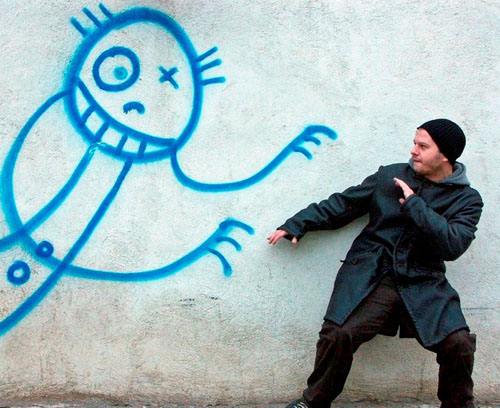Talking with Corneliu Porumboiu for the Festivalists, Tara Karajica asks, “Where do you see your place in the Romanian New Wave?” The answer: “I do not know, I think each one of us is very different. In a way, I am afraid… I do not like to compare myself. OK, I like the work of Cristi Puiu, I like the work of Cristian Mungiu, but, at the same time, I also love Rohmer and Godard. I see myself more universally in a way, because I also like Lucien Pintilie, and my roots are here, but at the same time, they are also abroad. So, I think that my movies are more linked to Rohmer than to my colleagues. And now, because we are past our first or second films, each one of us goes in his own direction and each has his own obsession.”
In the Los Angeles Times, Mark Olsen has a few questions for Tsai Ming-liang.
Jim Hemphill talks with Joe Dante “about Burying the Ex, his Trailers From Hell website, and the state of American movies in general on the eve of an American Cinematheque retrospective of his work.”
Also at Filmmaker, Peter Rinaldi has several questions for the team behind the restoration of Orson Welles‘s The Other Side of the Wind and the Indiegogo campaign to fund it.
“I begin my conversation by thanking [Mia] Wasikowska for her intrepid choices, and for being so protective of her characters’ entrancing privacy—even as it is now my errand to plumb their secrets a little, and hers.” That’s Nick Davis.
Also for Film Comment, Emma Myers talks with Sebastián Silva about Nasty Baby: “I feel that it’s good for your ego to portray yourself so disgustingly.”
Josephine Decker‘s Me the Terrible (2012) via Little White Lies
Isadora Pennington asks Brigitta Wagner about her new film, Rosehill, which stars Josephine Decker and Kate Chamuris and is a response to the question, “Why are we always seeing women saved by men?”
Vanity Celis introduces an interview with Pieter Van Hees at photogénie: “Following up on Linkeroever (2008) and Dirty Mind (2009), Waste Land (2014) doesn’t play coy with its rather overt subtext by presenting Brussels as a smouldering, near-mythological cityscape that’s teeming with the memory of darker days…. A fervent believer in the moral reprehensibility of negating a troubled chapter in our national history, Van Hees talked style, influence and ideology in an interview conducted in the wake of last year’s Young Critics Workshop at Film Fest Gent.”
Wong Kar-Wai‘s Chungking Express (1994) turned the Hong Kong high-rise Chungking Mansions into a tourist attraction. In the Stranger, Charles Mudede talks with Frances Cheong, a lecturer on genome sciences at the University of Washington, “and Jeremy Stone (a film lover who lives in Seattle and is familiar with Hong Kong) about the history, politics, architecture, and location of the building that gave a part of its name to and played a big role in Wong’s masterpiece.”
Patrick Z. McGavin talks with Mia Hansen-Løve about Eden, “art and creativity, collaborating with her brother and the deeply personal nature of her work and and the stylistic and formal patterns present in all of her work.”
André Gregory and Wallace Shawn in Criterion’s DVD closet
Also at RogerEbert.com, Peter Sobczynski interviews André Gregory and Wallace Shawn, while at Slant, Chuck Bowen sticks with Shawn. Then, elsewhere on the site:
Despite their vastly differing source materials and the expanses of years separating each of their releases, André Gregory and Wallace Shawn’s three film collaborations, My Dinner with André, Vanya on 42nd Street, and A Master Builder, retrospectively cohere as a thematic trilogy that follows several privileged men and women as they wrestle with their place in the world, struggling to breach the interiors of their embittered minds to connect with outer society. In each, the characters played by the two actor/screenwriter/playwrights have a similar relationship with one another: Shawn plays the rattled, impassioned, insecure foil to Gregory’s cooler, sporadically smug cucumber (though this pattern is cannily reversed in A Master Builder). Shawn’s characters are always the leads though, and each film charts a distinctive portion of their development, as they move from middle-aged everyman bookworm to powerful elder statesman.
Philip Maughan‘s conversation with John Berger comes by way of Movie City News. Maughan knows this is a big deal, and he needs to warm up first: “The life and work of John Berger represents a challenge. How best to describe the output of a writer whose bibliography, according to Wikipedia, contains ten ‘novels,’ four ‘plays,’ three collections of ‘poetry’ and 33 books labelled ‘other’?”
For BOMB, Gary M. Kramer talks with Michael Winterbottom about The Face of an Angel.
Steve Erickson talks with Crystal Moselle for Studio Daily. Relatedly, Flavorwire‘s Jason Bailey: “What Critics Get Wrong About What The Wolfpack Gets Wrong.”
The Guardian‘s Mark Brown talks with Jim Broadbent “about the dressed and painted wooden figures he has been quietly carving in his shed for the last six years.”
David Poland talks with Frederick Wiseman about Crazy Horse (2011)
For Dazed, Ashleigh Kane asks Chloë Sevigny about her new zine, No Time for Love.
For news and tips throughout the day every day, follow @KeyframeDaily. Get Keyframe Daily in your inbox by signing in at fandor.com/daily.




